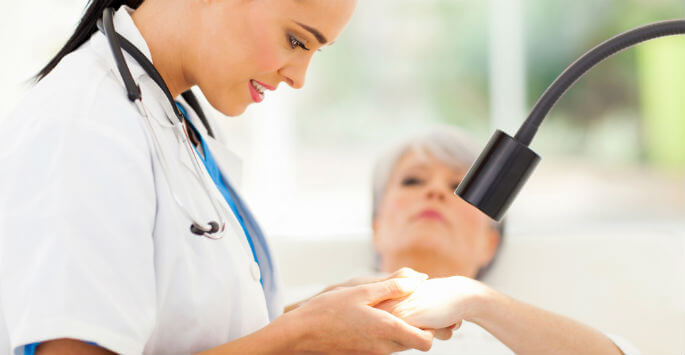Of the millions of new skin cancer cases that are diagnosed every year, basal cell carcinoma is the most common. Although this form of skin cancer tends to have the least risk, it also has the potential to develop into a serious medical complication if diagnosed at an advanced stage.
At Dermatology and Skin Cancer Center in Windermere, Florida, Dr. Jeannette Hudgens and our medical team are committed to not only combating basal cell carcinoma using the latest technology and techniques, but also about spreading awareness about this disease.
What is Basal Cell Carcinoma?
Basal cell carcinoma primarily develops on areas that are commonly exposed to the sun. Of the different varieties of skin cancer, it is the least likely to spread elsewhere on your body, but it can still move into bone or surrounding tissues if left untreated.
Basal cell carcinoma masses often begin as shiny, small bumps on the nose or other parts of the face, but they can also manifest on other areas of the body such as the legs and arms. Anyone in any stage of life can develop this type of skin cancer, but individuals with fair skin who spend a lot of time in the sun tend to be at a higher risk.
How Can Basal Cell Carcinoma Be Prevented?
While skin cancer cannot be 100 percent prevented, there are many ways that you can significantly reduce your risk of developing basal cell carcinoma:
- Annual skin checks at Dermatology and Skin Cancer Center. Having your skin routinely checked may seem unnecessary, but a yearly status of your skin condition will help Dr. Hudgens recognize if changes begin to occur, ensuring that any signs of basal cell carcinoma will be caught early on.
- Self checks at home. It is important to have a licensed dermatologist examine your skin if you believe something is wrong, but it is also a good idea to familiarize yourself with the spots, moles and darkened areas on your own skin to observe for signs of change.
- Taking regular precautions in the sun. This is a big one, as it is your best defense against developing basal cell carcinoma or other skin cancers. Doctor Hudgens and our medical team suggest using a broad-spectrum sunblock of SPF 30 or higher as well as wearing wide-brimmed hats and covering your skin while outdoors.
Additional Benefits of Annual Skin Checks
Having your skin assessed on a yearly basis is not only crucial to your overall skin health, it’s also very easy to fit into even the busiest schedule. Doctor Hudgens and our medical team thoroughly check everywhere from behind your ears and between your toes to even the most sensitive areas, but these full body checks only take up to 20 minutes on average – a small price to pay for a clean bill of skin health.
At Dermatology and Skin Cancer Center, our experienced staff is always available to answer any questions about annual skin checks or preventive skin care tips. Contact us today to schedule a consultation. We look forward to hearing from you!

